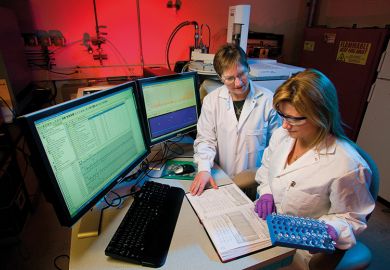A leading Australian physicist believes that doctoral programmes should be extended, saying that the current three-year norm leaves students underdone.
David Reilly says that 36-month PhDs dump students into the workforce before they are ready. A year or two more would allow them to look past the “low-hanging fruit” and attempt challenging and potentially time-consuming research projects, he argued.
“It changes the whole mindset,” said Professor Reilly, founding director of the Sydney Microsoft Quantum Laboratory at the University of Sydney. “It means you’re going to work on the hard things.
“It changes that whole discussion around what we’re doing broadly in academia, in science, and how we’re ensuring Australia is competitive.”
Professor Reilly heads one of three facilities that Microsoft has established outside the US to help it develop a quantum computer. The centre has attracted hundreds of millions of dollars from the information technology giant – Australia’s largest investment in quantum engineering – and he was named best emerging university leader at last year’s Australian Financial Review higher education awards.
In Australia, as in the UK, funding for PhD students is generally for three years – with up to six months’ additional funding if they can demonstrate exceptional circumstances.
Many other countries keep PhDs short, with three or four years the norm in Canada, New Zealand and much of continental Europe. While some countries allow a little longer, some terminate students’ registration after five or six years.
In the US, by contrast, doctoral studies typically take between five and seven years. Professor Reilly argued that shorter periods often leave doctoral graduates without the disciplinary understanding and publication records that they need to progress.
He said: “Imagine recruiting for an industry or postdoctoral position, and you’ve got somebody with five to seven years’ experience and somebody with three years’ experience. Which way are you going to go?
“An adviser told me he would never hire UK or Australian graduates fresh out of their PhDs. He’d wait for them to do a postdoc for a couple of years, and then hire them.”
Professor Reilly said that his own postdoctoral position at Harvard University “opened a lot of doors. But getting to Harvard was only possible because a postdoc in between brought me up to the competitive level of the American PhD”.
Since joining the University of Sydney, he has raised funds to help his doctoral students extend their studies by up to 30 months. While he has received “a lot of flak” for this, because university funding settings favour prompt PhD completion, he said that the graduate outcomes speak for themselves.
Of six doctoral students he has supervised to completion, two recent graduates are eyeing jobs with Microsoft and Massachusetts General Hospital, one already works with Microsoft, one has a postdoc at the University of California, Berkeley and another is at Caltech.
The sixth, Xanthe Croot, has claimed one of the three Dicke fellowships that Princeton University awarded this year to exceptional recent PhD recipients in experimental physics. Dr Croot, who took more than five years to complete her PhD, said that the extra time allowed her to “draw a line under experiments at a satisfying and logical pace” rather than rushing or abandoning them.
“I hit my stride in the last couple of years in terms of working and learning optimally,” she added. “It took a few years to build a really solid foundation in the field.”
Dr Croot said at least one of the papers that came out of her PhD would not have been possible without the additional years of study. Her publication record at graduation would have been “down a paper or two” but for the extra time.
Professor Reilly put it in rather starker terms when he said: “That extra year can be the difference between driving a cab and having a competitive fellowship on a world stage.”
PhD duration is a long-standing debate in Australia. A 2008 inquiry by a parliamentary science committee recommended six months’ additional funding, finding that PhDs typically took more than five years.
Professor Reilly said that bankrolling the additional study should be a joint responsibility, with the government providing matched funding for every dollar raised by supervisors. This would give the government “the best bang for their buck” in stemming brain drain and improving technical expertise, he added.
He argued that learning, like fitness training, is rarely linear. “You’ve got to build muscle to build muscle.
“Most of the action comes in that final six months. You need to learn enough to be in a position to bring it all together.”
POSTSCRIPT:
Print headline: Three-year PhDs ‘too short’ to ‘build research muscle’
Register to continue
Why register?
- Registration is free and only takes a moment
- Once registered, you can read 3 articles a month
- Sign up for our newsletter
Subscribe
Or subscribe for unlimited access to:
- Unlimited access to news, views, insights & reviews
- Digital editions
- Digital access to THE’s university and college rankings analysis
Already registered or a current subscriber?






